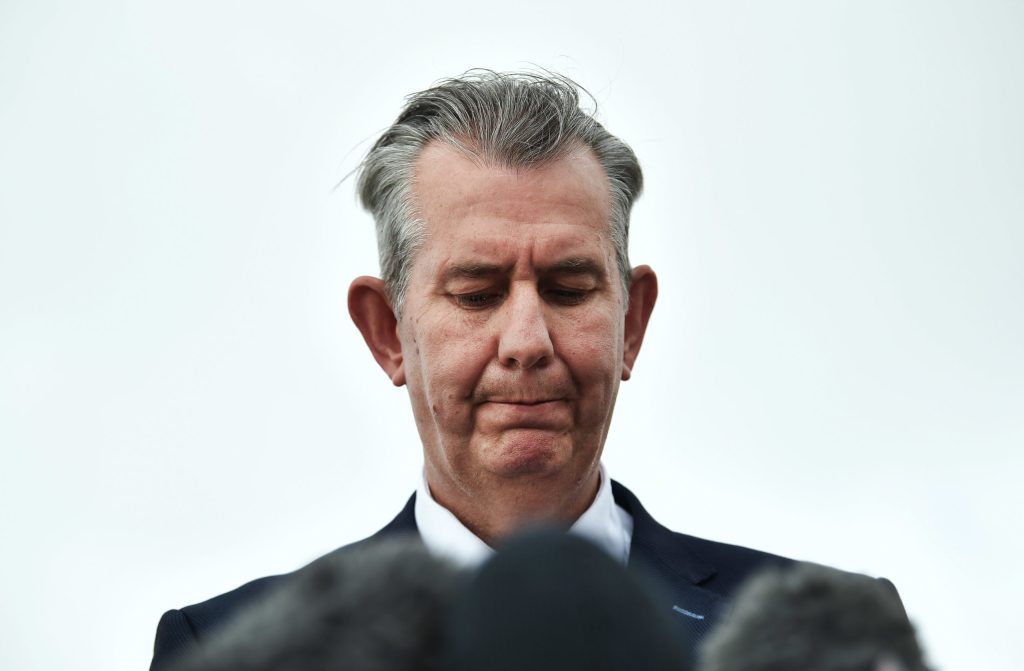Late last night, the UK government and Sinn Féin went over the heads of the Democratic Unionist party and agreed on a solution to the thorny issue of Irish language legislation. The Northern Ireland secretary Brandon Lewis promised to step in and pass the legislation if Stormont fails to do so. An ultimatum has now been given to make good on the January 2020 New Decade, New Approach deal — the agreement that promised the language laws in the first place and which was central to the return of power-sharing.
In theory, this rose would have allowed the DUP to formally nominate Paul Givan as Arlene Foster’s replacement as first minister with republican approval, avoiding the collapse of the institutions and a snap election.
In reality, however, this has caused a profound crisis. This owes largely to two major unionist concerns. The first contention is that the government saw fit, once again, to bilaterally engage with Sinn Féin. The second is that Edwin Poots, the supposed tough talker now in charge of the DUP, is willing to go along with it.
Before considering the party-political ramifications, the situation demonstrates that devolved government in Northern Ireland remains a twilight zone for accountability and normal behavior.
Factoring in allowances for Northern Ireland’s past and the political culture born out of that, Stormont is not a mature polity and is saddled with an immature political class incapable of seeing beyond their own narrow purviews.
The reflex reaction of demanding external mediation when the going gets tough is a testament to that. Twenty-three years on from the Belfast Agreement, people will rightly ask whether this is as good as it’s going to get.
Outsiders looking in will wonder why a piece of language legislation — rather than the province’s catastrophic National Health Service waiting list times or 280 primary school children not being allocated a secondary school place — merits an intervention from the secretary of state. This is allied to valid concerns about the amount of energy being expended on a language which even among nationalists is a minority pursuit.
Sinn Féin is steadfastly in favor of legislative provisions for Irish, large chunks of unionism less so; Simon Hoare, the Conservative chair of the Northern Ireland Affairs Committee no doubt spoke for many when he noted similar legislation in Wales didn’t herald the end of days for the Union there.
What Hoare fails to note is that in the 1980s, a senior Sinn Féin figure said that ‘every word of Irish spoken is like another bullet being fired in the struggle for Irish freedom’. While those outside Northern Ireland might find this all quite hyperbolic, on the narrow ground of Ulster’s culture war, this stuff matters. For those agitated unionists, their view is that this is yet more ground ceded since 1998, even though their leadership won some broader concessions around culture and the Ulster Scots dialect.
Given the knotty issue at hand, Brandon Lewis sweeping in and making it all go away could be construed as a welcome development. This is not the case.
Once again, it shows how isolated the DUP are. Westminster’s indifference towards them on this issue is clear and does not augur well for the meatier, constitutional issues Edwin Poots intends to get London to agree to.
The more immediate issue is a local one. Mere weeks into his leadership, Poots is already facing a rebellion of unparalleled severity in the history of the DUP. Bar his frontman Ian Paisley Jr, all the party’s Westminster contingent wrote to him demanding an immediate meeting explaining his rationale for accepting the terms of this agreement.
At a subsequent ill-tempered gathering attended by those MPs and the Assembly members, the bulk of them voted against Poots putting Givan’s nomination forward. Poots reportedly walked out of the meeting while the MP Sammy Wilson was voicing his opposition and pressed ahead with Givan’s nomination regardless.
Rumors of a potential vote of no-confidence in Poots abound, with well-placed sources suggesting this could be moved as soon as this evening. Given the manner in which he took office and the associated rancor, a day of recrimination like this was on the cards. But few anticipated it would take place so quickly and on such a scale.
Ironically, Brandon Lewis’s attempt to avoid political instability appears to have caused more political instability. The centrality of such a minor language (spoken by just 4,000 people at home) merely adds to the asinine nature of it all.
In all likelihood, an early election may be on the cards. Given current polling, that will return an even more dysfunctional Assembly. None of this ends in a situation where people in Northern Ireland get the good government they deserve.
This article was originally published on The Spectator’s UK website.


















